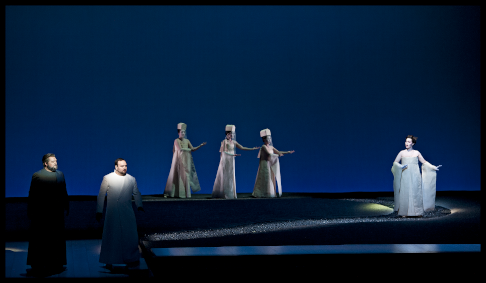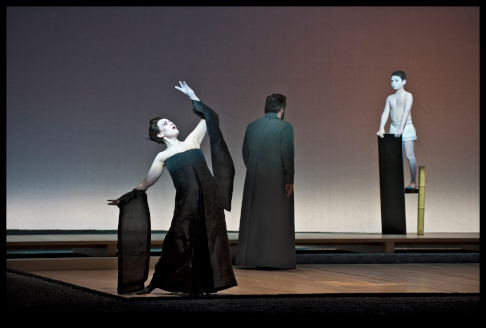![Sergio Escobar as Pinkerton and Elena Stikhina as Cio-Cio-San [Photo © BAUS]](http://www.operatoday.com/De%20Nationale%20Opera%20-%20Madama%20Butterfly%20credits%20BAUS%20DSC_1845.png)
24 Apr 2019
Cool beauty in Dutch National Opera’s Madama Butterfly
It is hard to imagine a more beautifully sung Cio-Cio-San than Elena Stikhina’s.
English Touring Opera are delighted to announce a season of lyric monodramas to tour nationally from October to December. The season features music for solo singer and piano by Argento, Britten, Tippett and Shostakovich with a bold and inventive approach to making opera during social distancing.
This tenth of ten Live from London concerts was in fact a recorded live performance from California. It was no less enjoyable for that, and it was also uplifting to learn that this wasn’t in fact the ‘last’ LfL event that we will be able to enjoy, courtesy of VOCES8 and their fellow vocal ensembles (more below …).
Ever since Wigmore Hall announced their superb series of autumn concerts, all streamed live and available free of charge, I’d been looking forward to this song recital by Ian Bostridge and Imogen Cooper.
Although Stile Antico’s programme article for their Live from London recital introduced their selection from the many treasures of the English Renaissance in the context of the theological debates and upheavals of the Tudor and Elizabethan years, their performance was more evocative of private chamber music than of public liturgy.
Evidently, face masks don’t stifle appreciative “Bravo!”s. And, reducing audience numbers doesn’t lower the volume of such acclamations. For, the audience at Wigmore Hall gave soprano Elizabeth Llewellyn and pianist Simon Lepper a greatly deserved warm reception and hearty response following this lunchtime recital of late-Romantic song.
For this week’s Live from London vocal recital we moved from the home of VOCES8, St Anne and St Agnes in the City of London, to Kings Place, where The Sixteen - who have been associate artists at the venue for some time - presented a programme of music and words bound together by the theme of ‘reflection’.
'Such is your divine Disposation that both you excellently understand, and royally entertaine the Exercise of Musicke.’
‘And there was war in heaven: Michael and his angels fought against the dragon; and the dragon fought and his angels, And prevailed not; neither was their place found any more in heaven … that old serpent … Satan, which deceiveth the whole world: he was cast out into the earth, and his angels were cast out with him.’
There was never any doubt that the fifth of the twelve Met Stars Live in Concert broadcasts was going to be a palpably intense and vivid event, as well as a musically stunning and theatrically enervating experience.
‘Love’ was the theme for this Live from London performance by Apollo5. Given the complexity and diversity of that human emotion, and Apollo5’s reputation for versatility and diverse repertoire, ranging from Renaissance choral music to jazz, from contemporary classical works to popular song, it was no surprise that their programme spanned 500 years and several musical styles.
The Academy of St Martin in the Fields have titled their autumn series of eight concerts - which are taking place at 5pm and 7.30pm on two Saturdays each month at their home venue in Trafalgar Square, and being filmed for streaming the following Thursday - ‘re:connect’.
The London Symphony Orchestra opened their Autumn 2020 season with a homage to Oliver Knussen, who died at the age of 66 in July 2018. The programme traced a national musical lineage through the twentieth century, from Britten to Knussen, on to Mark-Anthony Turnage, and entwining the LSO and Rattle too.
With the Live from London digital vocal festival entering the second half of the series, the festival’s host, VOCES8, returned to their home at St Annes and St Agnes in the City of London to present a sequence of ‘Choral Dances’ - vocal music inspired by dance, embracing diverse genres from the Renaissance madrigal to swing jazz.
Just a few unison string wriggles from the opening of Mozart’s overture to Le nozze di Figaro are enough to make any opera-lover perch on the edge of their seat, in excited anticipation of the drama in music to come, so there could be no other curtain-raiser for this Gala Concert at the Royal Opera House, the latest instalment from ‘their House’ to ‘our houses’.
"Before the ending of the day, creator of all things, we pray that, with your accustomed mercy, you may watch over us."
The doors at The Metropolitan Opera will not open to live audiences until 2021 at the earliest, and the likelihood of normal operatic life resuming in cities around the world looks but a distant dream at present. But, while we may not be invited from our homes into the opera house for some time yet, with its free daily screenings of past productions and its pay-per-view Met Stars Live in Concert series, the Met continues to bring opera into our homes.
Music-making at this year’s Grange Festival Opera may have fallen silent in June and July, but the country house and extensive grounds of The Grange provided an ideal setting for a weekend of twelve specially conceived ‘promenade’ performances encompassing music and dance.
There’s a “slide of harmony” and “all the bones leave your body at that moment and you collapse to the floor, it’s so extraordinary.”
“Music for a while, shall all your cares beguile.”
The hum of bees rising from myriad scented blooms; gentle strains of birdsong; the cheerful chatter of picnickers beside a still lake; decorous thwacks of leather on willow; song and music floating through the warm evening air.
![Sergio Escobar as Pinkerton and Elena Stikhina as Cio-Cio-San [Photo © BAUS]](http://www.operatoday.com/De%20Nationale%20Opera%20-%20Madama%20Butterfly%20credits%20BAUS%20DSC_1845.png)
It is hard to imagine a more beautifully sung Cio-Cio-San than Elena Stikhina’s.
For her, Dutch National Opera has revived Robert Wilson’s ultra-minimalistic Madama Butterfly, first unveiled in 1993 at the Paris Opera, and presented many times since at various houses. The severe beauty of the production has not aged a bit. Yet, despite the satisfaction they give to the senses, both Wilson’s images and Stikhina’s singing leave one wanting more.
Bearing all the Wilson hallmarks, this Butterfly is choreographed in precise, stylized movement inspired by Japanese Noh theatre and Butoh dance. The demands on the singers are great. They must do things like sustain legato while rising slowly from a kneeling position, and move fluidly across the rough graveled surface delineating Butterfly’s garden, which surrounds the wooden floor representing her house. The absence of an actual set is offset by a lit backdrop that changes from cerulean blue to blood red to a rose-and-peach dawn. Extreme minimalism also means hardly any props. Blossoms are completely absent from the Flower Duet between Cio-Cio-San, the disposable bride of U.S. naval officer F.B. Pinkerton, and her maid Suzuki. Cio-Cio-San’s possessions, such as her mirror and fan, are conjured up by hand gestures, as is the knife with which she ultimately kills herself. When the letter from Pinkerton that seals her fate appears in a real envelope its material presence is almost shocking.

Naturally, Cio-Cio-San’s death is blood-free. She quivers and falls lifeless in slow motion, like the pinned butterfly she prophetically describes on her wedding night. At the other extreme, Puccini’s score is hyperdescriptive, teeming with birdsong and gongs, imitating winded gaits and graceful steps. Whether the contrast between the spare visuals and the score results in heightened drama or an unnerving emotional dissonance depends on to what extent one accepts Wilson’s aesthetic. It is certain, however, that for the first to happen, the singers need to provide the feelings that animate the formalized beauty of their surroundings. How do you move with mathematically plotted grace and move hearts at the same time? Projecting great warmth and tenderness, the luxurious mezzo-soprano Enkelejda Shkosa as Suzuki proved it can be done.
Baritone Brian Mulligan as the American consul Sharpless seemed less comfortable in his choreographic straitjacket, but sang sonorously, his generous sound exercising a kindly authority. Character tenor Saverio Fiore was appropriately irritating as the marriage broker Goro, soon finding his feet after a vocally shaky beginning. Among the minor roles, there were strong contributions from Anneleen Bijnen as Kate Pinkerton, Martin Mkhize as the Imperial Commissioner and Carlo Cigni as a forbidding Uncle Bonze. Sergio Escobar’s trumpeted top notes, with fearlessly open Italian vowels, embodied Pinkerton’s odious sense of entitlement. His tenor was less appealing at mezza voce, but Pinkerton is an arrogant sensualist and does not necessarily require great vocal subtlety.
 Elena Stikhina as Cio-Cio-San and Brian Mulligan as Sharpless
Elena Stikhina as Cio-Cio-San and Brian Mulligan as Sharpless
Soprano Elena Stikhina has a truly special voice, satiny and evenly produced. Initially, she held her high notes only briefly, skipping the elective high D flat at Cio-Cio-San’s entrance, but in Acts Two and Three, where they really matter, her top notes cleaved the air dazzlingly. The rest of the voice is so gorgeous, you never went her to stop singing. And yet, her portrayal was too even-keeled to fully encompass Butterfly’s tragedy. A certain equanimity in Act One could be explained by Butterfly tentatively trying on her new role as an American Navy wife. Wilson’s direction, especially in the mannered love duet, certainly lends itself to this interpretation. But, as her world fell apart, Stikhina only skimmed the surface of Butterfly’s deep dejection. Hope, disappointment, shame and terror all sounded golden, but very similar to each other. Perhaps in a more conventional stetting her characterization would have been more detailed. On opening night, however, Stikhina’s Butterfly, like Wilson’s staging, came wrapped in loveliness but lacked a throbbing heart.
In the pit, the Residentie Orkest did not have the greatest start. The bustle of the wedding preparations sounded bumbling rather than energized. Gradually, the musicians caught up with conductor Jader Bignamini, but the overall impression was of an ensemble that had progressed little beyond technical mastery of the score. Bignamini tried all night to stir up the broad sweep essential for Puccinian drama, to no avail. The orchestra responded mostly by playing loudly, with little dynamic purpose or refinement of expression. Something went wrong between a conductor with an audibly clear sense of direction and this usually highly competent orchestra. On the other hand, each brief appearance of the Dutch National Opera Chorus lifted the performance to its expected level. As Cio-Cio-San’s family, they were also a sight to behold in Frida Parmeggiani’s handsomely sculpted costumes. With so many pluses, this run of Madama Butterfly has the potential to simmer into something more potent than was brewed at the premiere.
Jenny Camilleri
Cast and production information:
Elena Stikhina, Madama Butterfly (Cio-Cio-San); Enkelejda Shkosa,Suzuki; Sergio Escobar, F.B. Pinkerton; Brian Mulligan,Sharpless; Saverio Fiore, Goro; Tim Kuypers,Prince Yamadori; Carlo Cigni, The Bonze; Harry Teeuwen, Yakusidé; Martin Mkhize, The Imperial Commissioner; John van Halteren, The Official Registrar; Marieke Reuten, Cio-Cio-San’s Mother; Anneleen Bijnen, Kate Pinkerton; Tomoko Makuuchi, Aunt; Dana Ilia, Cousin; Orso Stamet/Fernando Stouraitis, Dolore. Robert Wilson,Direction, Set and Lighting Design; Frida Parmeggiani, Costumes; A.J. Weissband, Lighting Design. Jader Bignamini, Conductor. Dutch National Opera Chorus. Residentie Orkest. Seen at Dutch National Opera & Ballet, Amsterdam on Tuesday, the 23rd of April, 2019.